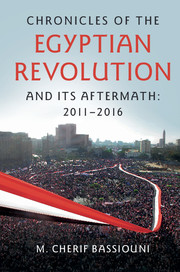Book contents
- Frontmatter
- Dedication
- Contents
- Preface
- Acknowledgments
- List of Abbreviations
- Introduction
- 1 The Early Stage of the Revolution
- 2 Mubarak Relinquishes the Presidency and the SCAF Assumes Power
- 3 A Prelude to Democracy: 2011–2012 Elections
- 4 The Morsi Presidency: June 30, 2012 to July 3, 2013
- 5 The Military's Return to Power and the El-Sisi Presidency
- 6 2015Legislative Elections and the Changing Civilian Political Landscape
- 7 The Military Institution: Its Power, Influence, and Culture
- 8 Violence and Repression
- 9 The Accountability Gap
- 10 The Justice System in Crisis
- 11 The Constitutional Quagmire
- 12 Demographics, Education, and the Economy
- 13 Geopolitical Factors
- 14 Concluding Assessment
- Pictures of the Egyptian Revolution and Related Events
- Bibliography
- Index
3 - A Prelude to Democracy: 2011–2012 Elections
Published online by Cambridge University Press: 24 November 2016
- Frontmatter
- Dedication
- Contents
- Preface
- Acknowledgments
- List of Abbreviations
- Introduction
- 1 The Early Stage of the Revolution
- 2 Mubarak Relinquishes the Presidency and the SCAF Assumes Power
- 3 A Prelude to Democracy: 2011–2012 Elections
- 4 The Morsi Presidency: June 30, 2012 to July 3, 2013
- 5 The Military's Return to Power and the El-Sisi Presidency
- 6 2015Legislative Elections and the Changing Civilian Political Landscape
- 7 The Military Institution: Its Power, Influence, and Culture
- 8 Violence and Repression
- 9 The Accountability Gap
- 10 The Justice System in Crisis
- 11 The Constitutional Quagmire
- 12 Demographics, Education, and the Economy
- 13 Geopolitical Factors
- 14 Concluding Assessment
- Pictures of the Egyptian Revolution and Related Events
- Bibliography
- Index
Summary
INTRODUCTION
After almost sixty years of dictatorship, Egypt moved toward democracy in less than six months. That this shift took place under the auspices of the military, in the form of the Supreme Council of the Armed Forces, or SCAF, made it no less extraordinary, and the fact that the SCAF promptly proceeded with the election process under judicial supervision – with the presence of international observers for the first time in Egyptian history – was beyond most people's expectations. Regrettably, only fifty-two percent of the electorate cast their vote, but it was a free and fair election. Also amazing was the fact that the outcome was respected, if only for a short period of time.
How it all took place is a story well worth telling, as are its sometimes tedious details, which show the normalcy of what happened, complete with human frailties. The information contained in these pages attests to the people's yearning for democracy and to their willingness to follow legal and administrative processes and procedures in a peaceful and orderly manner. But not everything was pristine.
HOW THE SITUATION EVOLVED
The SCAF presumed that, with the renunciation of power by Mubarak, it would assume, as a collective body acting through its chairman, Field Marshal Tantawi, the powers of both the presidency and the legislature, even though the 1971 Constitution did not provide for such a transition. Instead, it called for the president of the People's Assembly to be acting president for sixty days pending new elections. This succession clause had been exercised after the assassination of President Sadat, when the president of the People's Assembly, Sufi Abu Taleb, temporarily assumed the presidency until Hosni Mubarak was elected.
It worked then and could have worked again, except that in 2011, the president of the People's Assembly, Ahmed Fathi Sorour, was under criminal investigation (he was subsequently arrested on charges of instigating violence and corruption, imprisoned, and then released after he reached a financial settlement with the prosecution). The next in line was the president of the Constitutional Court, and he could have been tapped for the job. But most people thought the security situation was grave enough to require that the military be in charge.
- Type
- Chapter
- Information
- Publisher: Cambridge University PressPrint publication year: 2016



